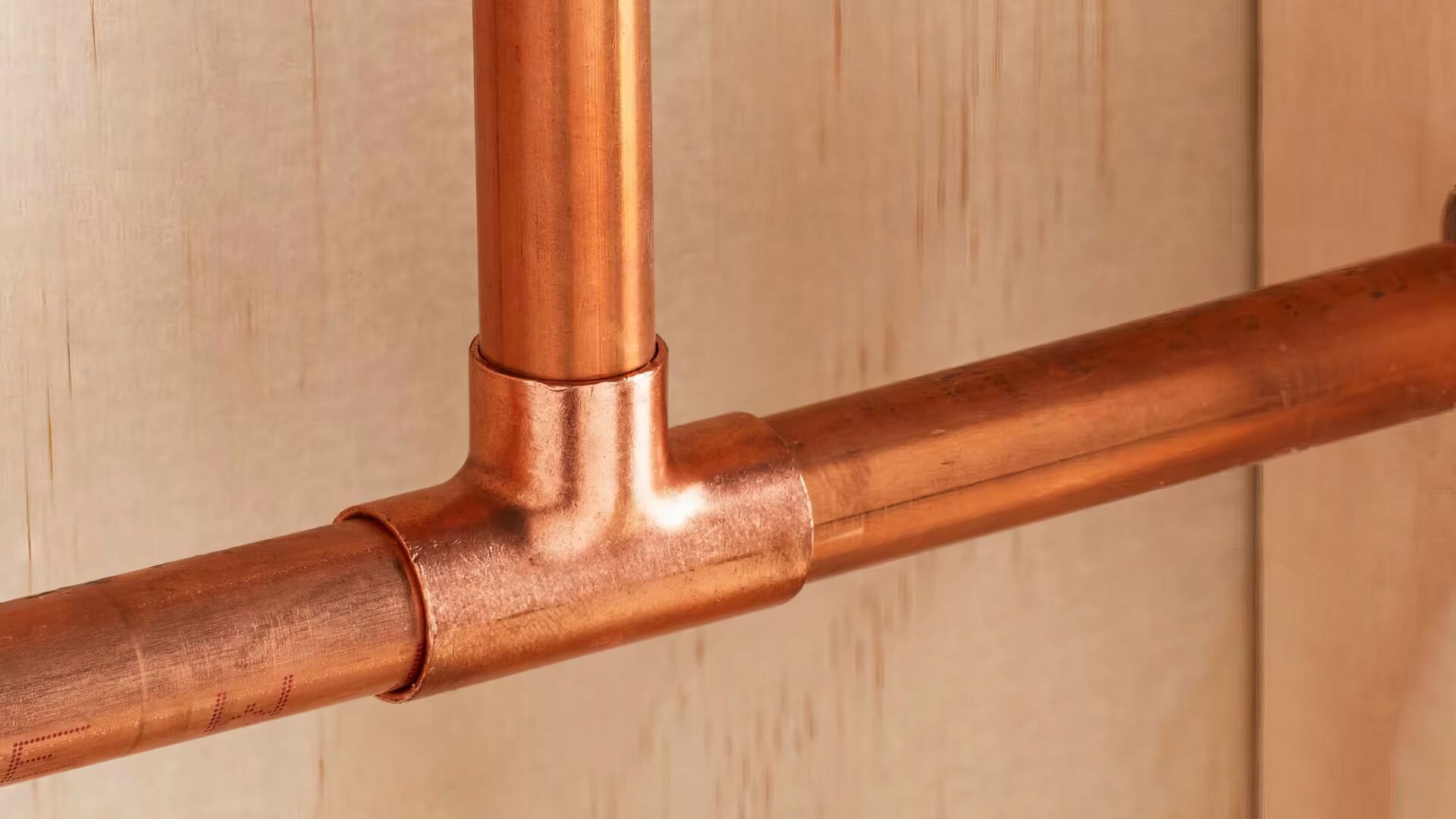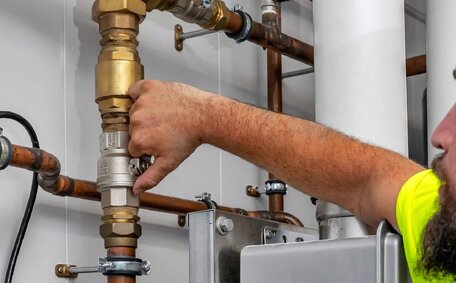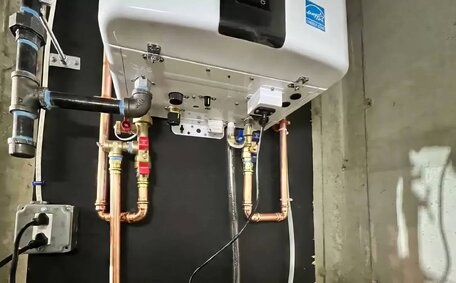Introducing heat pump hot water systems
Heat pump hot water systems, especially when combined with solar energy, are innovative and energy-efficient alternatives to traditional electric and gas water heaters. Unlike systems that heat water directly, heat pumps use electricity to transfer heat from the surrounding air into your water tank, offering an alternative to the more conventional electric hot water system heating methods.
Compared to traditional electric and gas hot water systems, heat pumps are remarkably efficient, using about 60% less electricity. These cost savings highlight the multitude of benefits offered by heat pump technology, including its ability to harness ambient heat and cut energy usage.
How Heat Pump Hot Water Systems Work
Heat pump water heaters function reminiscent of reverse-cycle air conditioners, designed to provide amplified efficiency and comfort. The fan compressor unit is crucial to the system, absorbing external ambient heat and transferring it into the water inside your tank. The absorbed heat travels indoors via refrigerant pipes, facilitating a seamless heat exchange with your water system.
The refrigerant captures outdoor heat, brings it indoors, and infuses it into the tank’s water to effectively warm the water, reaching approximately 60°C without using traditional heating elements.
Benefits of Heat Pump Hot Water Systems
- Use 60% less electricity than conventional storage systems
- Lower greenhouse emissions due to reduced energy use
- Reduced running and maintenance costs over the long term
- Government rebates available in many states
- Ideal for integration with solar panel systems to enhance renewable energy utilisation
Contact our team at Epping Plumbing for a free quote and to learn more about how a hot water system for your household can be tailored to meet your needs specifically.
How do heat pump hot water systems work?
Hot water heat pump systems employ an efficient refrigeration cycle to harness renewable heat surrounding the outside air. This system captures ambient air heat to warm water while dispensing with the need for direct electrical heating.
The three principal components are the evaporator, compressor, and heat exchanger.
- The outdoor evaporator with its fan efficiently draws air over coils containing a refrigerant, which absorbs ambient heat.
- The evaporator captures the ambient air heat and passes this to the compressor where the refrigerant is compressed, increasing its temperature.
- The now heated refrigerant is then fed into the heat exchanger, where it transfers this heat to the water.
Once the refrigerant dissipates its heat, it condenses back into a liquid state and repeats the cycle. The system only uses electricity for the compressor/fan, avoiding the high amounts of energy traditionally used to power electric heating elements.
Heat pump water heaters often support integrated connections with solar systems to enhance efficiency and sustainability.
Heat pump efficiency compared to traditional water heaters
Heat pump hot water systems employ sophisticated technology that significantly enhances energy efficiency and reduces overall energy consumption compared to traditional resistance or gas heaters. While it’s important to acknowledge that older systems use traditional heating methods or heating elements to warm water, heat pumps use advanced refrigerant technology and specialised compressors to extract ‘free’ heat from the air.
As a result, they achieve the same water heating capacity with 60-75% less electricity consumption than traditional systems. For the average household, depending on the amount of water used, a solar hot water system can add up to hundreds of dollars in potential annual savings.
Lower Energy Bills
The reduced energy consumption of heat pump systems can lead to lower electricity bills. You can expect savings of around $300 to $500 per year compared to conventional electric systems.
How much you save depends on various factors such as your tariff, family size, hot water usage, and the impact of energy upgrades as reflected by the efficiency rating of your chosen model. Generally, the higher the efficiency star rating, the much less energy and money you will need to spend.
Lower Emissions
Their lower energy usage not only reduces your carbon footprint but also positions them as substantial players in environmental conservation. There are no direct greenhouse emissions, and the 60-75% reduction in energy use leads to a proportional drop in indirect emissions from electricity generation.
This brands heat pumps as outstanding eco-friendly alternatives, aligning well with growing sustainability efforts and targets for emissions reduction.
Cost savings from using a heat pump system
One of the biggest advantages of installing a heat pump system is the cost savings over time, despite the higher initial investment than traditional options.
Lower Installation Costs
The upfront cost for a heat pump system ranges from $2500 to $5000, which is roughly 30% higher than that of traditional systems. However, with rebates like those offered for power heat pump installations, the Australian federal and state rebates can significantly reduce the upfront cost.
Significant Running Cost Savings
The major advantage is the cost-effective operation of the system, leading to significantly lower running costs and power bills. With 60-75% less electricity usage, heat pump systems can potentially save households hundreds each year, effectively paying for themselves in a few years.
Over a 10 year period, total savings of $5000+ compared to standard electric storage systems are achievable through reduced energy bills. When financing options are considered, the long term savings make heat pumps more affordable.
Low Maintenance Costs
Beyond the savings on power bills, heat pumps boast very low maintenance needs. They eliminate the need for gas lines, exhaust flues, and frequent anode rod replacements required by traditional systems. Some of the few potential costs include cleaning air filters or repairs from storm damage.
In the grand scheme of things, the lifetime expenditure for an efficient heat pump system is notably less than that of conventional heaters.
Environmental benefits of heat pump systems
Heat pump systems cycle the air’s heat, rather than resorting to conventional electric heating elements, hence flaunting a significantly reduced carbon footprint.
By requiring significantly less power, using 60-75% less electricity, heat pump systems can lead to substantial reductions in greenhouse gas emissions from power generation. In Australia, adopting energy-efficient heat pump solutions stands among the most effective methods households can use to minimize carbon emissions.
The Australian government states that energy-efficient electric heat pump hot water systems can reduce household carbon emissions by roughly 60% compared to conventional electric water heaters.
As environmentally friendly sources like solar power and wind energy continue to displace fossil fuels in electricity generation, the emissions savings from these more sustainable options will keep improving over time.
Environmental Rebates
Due to their environmental benefits, heat pump systems qualify for government rebates and incentives across Australia, promoting the uptake of sustainable technologies.
Incentives up to $1000 are on offer in areas including Victoria, New South, SA and the ACT for transitioning from traditional systems to a heat pump water heater.
Contact our team at Epping Plumbing to learn more about potential rebates you can access to improve the affordability when you upgrade your eco-friendly technology.
Available rebates and incentives for heat pump systems
Rebates and Incentives for Heat Pump Systems
Epping residents can access a range of rebates and incentives to assist with the cost of installing a water heat pump system:
Victorian Government Rebate
Under the Solar Victoria Hot Water Rebate Programme, households in Epping can benefit from up to $1000 off the installation cost for an eligible heat pump system, replacing a gas or electric storage water heater.
SA Government Rebate
South Australian households can obtain up to $500 off installation costs by upgrading from electric or gas systems to approved heat pump models.
Renewable Energy Certificates
As heat pumps are considered a renewable energy technology, they qualify for Renewable Energy Certificates which provide an additional upfront discount on installation costs.
Electricity Retailer Discounts
Some electricity companies offer deals for their customers when switching to approved heat pump water heaters, so check with your provider to see if any additional savings can get your approval.
ATO Tax Deductions
Upgrading to a more environmentally-friendly water heating system may qualify for tax deductions, helping to balance the initial cost over time.
The team at Epping Plumbing can help you find out about the latest incentives for sustainable plumbing products and work with you to find the most cost-effective solution that suits your personal requirements.
Installing a heat pump hot water system
Installation Requirements
Installing a heat pump hot water system is relatively straightforward, but there are some important factors to consider before installation.
Location
The external unit should be located in an open outdoor area with access to fresh air for heat absorption. Common locations include on the ground, on a concrete pad or hung on a wall. It should not be located in direct sunlight, near sources of heat, or where trapped debris could block air flow.
Electrical and Plumbing
A heat pump system requires standard 240-volt power without the need for specialised electrical work in the majority of homes. It simply needs a weatherproof double socket outlet mounted near the external unit. A licenced electrician can install or modify circuits if needed.
Plumbing-wise, heat pumps integrate with existing water lines and storage tanks, similar to traditional systems, requiring only a circulator pump and adapted pipe sizes for the external coils.
Installation Process
- Mount the outdoor unit on a concrete pad in a suitable location.
- Install the control unit and connect the outdoor unit to the internal system.
- Connect the existing tank’s hot and cold water lines to the new system.
- Connect the power supply and commission the equipment.
Installation typically takes 2 to 3 days, with minimal disruption to your household. Our expert plumbing team can manage the entire transition, guaranteeing a smooth conversion to this eco-friendly water heating solution.
Contact the team at Epping Plumbing to discuss which right hot water system is suited for your home and to obtain an accurate installation quote.
Maintaining your heat pump system
One of the stellar advantages of heat pump hot water systems compared to traditional water heaters is that they require very little maintenance.
Nonetheless, maintaining the efficient characteristics that hot water systems come with, entails performing a few straightforward maintenance tasks:
- Check and clean the air filter every 3 months - Clogged filters reduce efficiency.
- Clear debris and overhanging branches from around the outdoor unit.
- It’s important to visually examine refrigerant pipes and insulation for damage that can result in efficiency losses.
- Wipe down the outdoor unit casing to remove dirt and grime.
It’s important to have your heat pump serviced by a licenced technician every 2 years. They will thoroughly inspect all components and check refrigerant levels and pressure.
Basic maintenance is quick, easy and crucial to maximise performance. Epping Plumbing’s technicians can provide repairs, parts replacements, and upgrades, honing your system’s efficiency for optimal household performance over time.
With our scheduled maintenance plans, we take care of your heat pump’s routine servicing needs so you can enjoy reliable, efficient hot water for years to come.
Case studies from heat pump users
Case Study 1 - The Jones Family
The Jones family from Epping, excited about heat pump technology, installed a system, reducing energy consumption substantially compared to their ageing electric storage water heater. Despite higher initial costs, they expected long-term savings from lower energy bills.
"Our bills dropped by about 30% after upgrading to the heat pump system," said Mrs. Jones. "It’s provided plenty of hot water for our family of four and the running costs are far lower than our old electric heater."
The state government granted the Jones family a $950 rebate for switching from electric, easing the initial installation costs.
Case Study 2 - Sam’s Plumbing Business
Local Epping plumber Sam implemented a commercial-grade heat pump hot water system to efficiently manage his small business’s water heating needs. He has been delighted with its performance.
"As a tradesperson, I require energy efficient heat for my hot water supply for my day-to-day operations. The heat pump system has worked flawlessly over the past two years, while reducing my energy costs," Sam said.
He estimates saving around $600 annually on electricity bills since installing the heat pump system in his warehouse.
"Based on my experience, I actively recommend heat pump technology to many of my customers looking for energy-efficient replacements for faulty or inefficient water heaters," he said.






